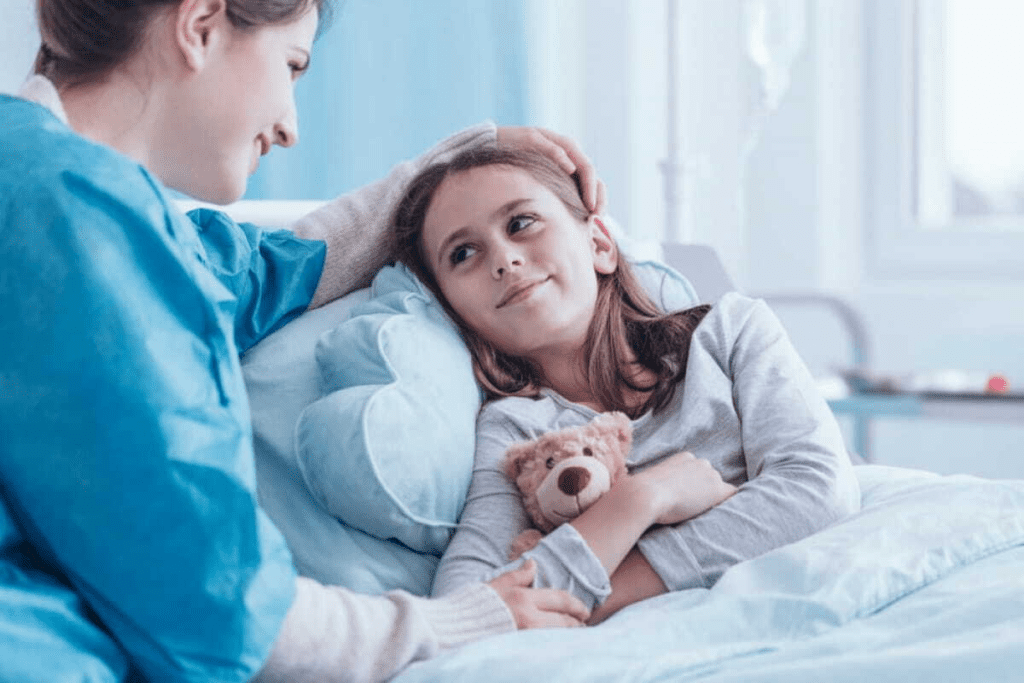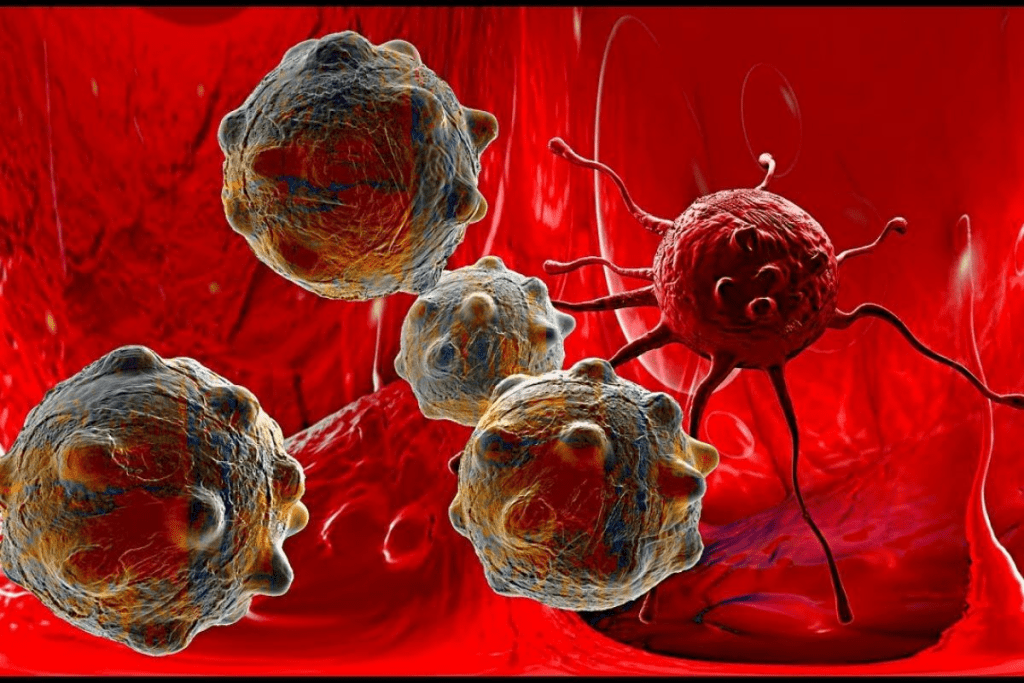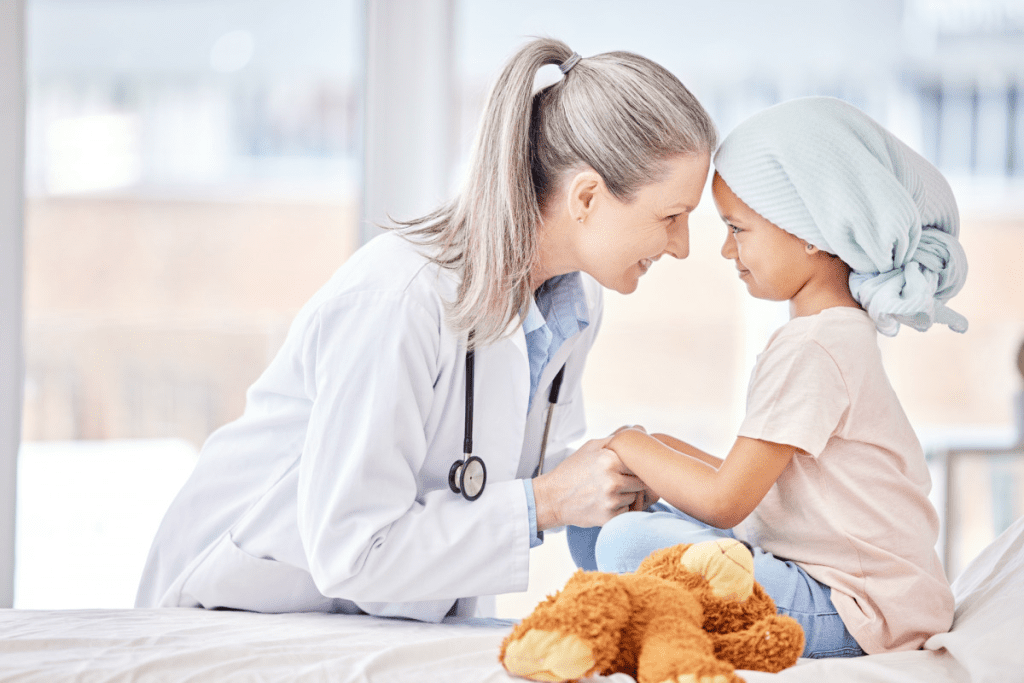Last Updated on November 13, 2025 by
What can I do to help a child with cancer? Get the crucial and powerful script for explaining a 5 year old with cancer what to tell classmates.
Getting a cancer diagnosis for a child is very tough. But with the right support, kids can get through this tough time. At LIV Hospital, we know how important it is to have a full care plan. This includes medical help, emotional support, and practical assistance.

Every year, about 400,000 kids worldwide get cancer. Luckily, more kids are surviving thanks to better treatments. We focus on giving kids the best care possible, using new and effective methods.
We promise to give comprehensive support to patients from all over. If your child has cancer, we’re here to help. We’ll guide you through treatment and offer the support you need.
To help children with cancer, we need to know the basics. This includes how common it is, the different types, and how often kids survive. Childhood cancer is a big health problem worldwide.
Childhood cancer is rare but has a big impact. In 2025, about 9,550 new cases will be found in kids in the US. It’s a global issue, affecting kids everywhere. The most common cancers in kids are leukemias, brain tumors, and lymphomas, as shown by childhood cancer statistics.
Thanks to better treatments, more kids are surviving cancer. Survival rates have gone up a lot. For example, more kids with leukemia are living longer, giving hope to families. Advances include:
The most common cancers in kids are:

Knowing these facts helps us support kids with cancer. By understanding, we can offer the care and support they and their families need.
It’s important to know how cancer affects kids. They might feel scared, anxious, sad, or angry. This depends on their age and how much they understand about cancer.

How kids understand cancer changes with age. Young ones might not get it, while older kids and teens can grasp more, but worry about their future.
For the little ones, it’s best to explain things simply and reassuringly. Say something like, “You have cancer, and we’ll do everything to make you better.” As they get older, they can learn more about their illness and treatment.
Kids with cancer often feel many emotions. Some common feelings include:
It’s key to recognize these feelings and offer emotional support. Listening to their concerns and validating their emotions helps them feel understood and comforted.
Parents and caregivers should watch for signs of emotional distress. Look for:
If you see these signs, it’s important to seek support from healthcare professionals. They can help manage the child’s emotional well-being.
By understanding and addressing the emotional impact of cancer on kids, we can help them face this tough time with more strength and support.
Supporting a child with cancer means creating a caring environment. It’s about balancing treatment with fun activities and taking care of yourself. As a parent, you’re key to your child’s recovery.
It’s important to make your home a safe and welcoming place for your child. Talk openly with your child, letting them share their feelings and worries. Open communication helps you understand their needs and offer emotional support.
Being there to listen, showing love, and doing things your child likes can really help. These small actions can make a big difference in their mood.
It’s important to mix cancer treatment with fun activities. Let your child do things they love, as long as it’s okay with their treatment. This keeps them feeling normal and happy.
For example, if they can, they should keep going to school or doing hobbies. Find a balance that supports your family and meets your child’s needs during tough times.
It’s easy to forget about your own needs when supporting a child with cancer. But, self-care is key for your health and helping your child. Make sure you rest, eat well, and take time for yourself.
Look for support from family, friends, or groups. Talking to others who get it can help you feel better and get advice. Remember, taking care of yourself is not selfish. It’s necessary to be a good parent during this time.
There are many resources out there, like counseling, online forums, and groups for families dealing with childhood cancer. These can offer help and support.
Telling classmates about a child’s cancer diagnosis needs care and simple words. You want your child to feel supported by their friends. We’ll look at how to have this important talk.
Explaining cancer to 5-year-olds should be easy and clear. You could say, “Your friend has an illness called cancer, and they’re getting treatment to feel better.” Stay away from hard medical terms and scary pictures.
Here are some tips for explaining it in a way kids can understand:
Children often ask about cancer, and it’s key to answer them truthfully and reassuringly. They might ask, “Is cancer catching?” or “Can my friend play with them?” Be ready with clear and comforting answers.
Some common wrong ideas to clear up include:
It’s also vital to prepare your child for how their classmates might react. Some friends might be very supportive, while others might be confused or unsure. Reassure your child that it’s okay if not everyone knows what to say or do.
To help your child deal with this, consider:
By being sensitive and preparing your child for their peers’ reactions, you can help make a supportive space for them to face their cancer journey.
When a child in the classroom is diagnosed with cancer, teachers can make a big difference. They help with both their education and emotional well-being. Schools play a key role in supporting these children, and there are many ways to do so.
Children with cancer often face long treatment periods. This can stop their school progress. Teachers can help by giving assignments that the child can do during treatment. This keeps them connected to their schoolwork.
An inclusive classroom is key for a child with cancer to feel supported. Teachers can help by teaching classmates about cancer. This encourages empathy and understanding.
Working together is essential for supporting a child with cancer. Teachers, medical teams, and parents must coordinate. This ensures the child’s educational and medical needs are met.
We can help by:
By taking these steps, teachers and schools can greatly support children with cancer. They help these children face treatment challenges while keeping up with their education and emotional well-being.
A childhood cancer diagnosis can change a family’s life in big ways. But, with support from friends and family, they can get through it. There are many ways to help that can make a big difference.
One great way to help is by cooking meals and doing household chores. Families often find it hard to keep up with daily tasks when dealing with cancer. Preparing meals in advance or helping with grocery shopping can be a big help. Also, helping with cleaning and laundry can reduce daily stress.
Setting up a meal train or a schedule for household help can provide steady support. This not only meets practical needs but also offers emotional comfort, knowing they’re not alone.
Getting to and from treatment can be tough for families. Driving them to appointments or giving gas cards can make a big difference. Also, childcare for siblings is very important. It lets parents focus on their child who’s getting treatment.
Cancer treatment can be very expensive. Financial help from friends and family is very important. Setting up a fund or contributing to fundraising efforts can help with medical costs. Also, helping families find resources like government programs or non-profit organizations can be very helpful.
By providing these kinds of support, friends and family can make a big difference. We know every little bit helps, and together, we can support families through this tough time.
The words we choose when talking to a child with cancer and their family matter a lot. It’s key to be honest yet supportive at the same time.
Using supportive words can make children with cancer feel more at ease. Saying “I’m here for you” or “You’re not alone” can offer a lot of comfort. It’s also good to acknowledge their feelings and show you get what they’re going through.
For example, saying “I can see that you’re really upset” or “I understand that this is a tough time for you” can be very reassuring.
For more guidance on talking to children about cancer, you can visit resources that offer valuable tips and advice.
Knowing what not to say is just as important as knowing what to say. Phrases that downplay their experience or seem insensitive can be very hurtful. For instance, saying “You’re lucky it’s not worse” or “At least you’re young” can make them feel worse.
It’s also best to avoid making promises you can’t keep, like “Everything will be fine.” This can lead to mistrust if things don’t go as expected.
Instead, focus on giving genuine support and letting them know you’re there to listen. Sometimes, it’s not what you say but that you’re there that matters.
Honesty is key when talking to children with cancer. It’s important to be truthful, but also consider their age and understanding. Using age-appropriate language helps them understand what’s happening.
For younger kids, simple explanations work best. Older kids can handle more detailed information. Listening is also a big part of honest conversations. Let them share their fears and concerns without interrupting or judging.
This builds trust and makes sure they feel supported during their treatment.
When a child gets cancer, friends and family want to help but may not know how. This is true, even if they can’t be there in person. There are creative ways to support a child with cancer from afar.
Technology helps us stay close to loved ones, even when we’re far apart. We can use virtual tools to support a child with cancer. Here are some ways:
These technologies help us stay connected with the child and their family. They offer emotional support during tough times.
Care packages and gifts can bring joy and comfort to a child with cancer. When picking items, think about what the child likes and needs. Here are some ideas:
These gestures show we care and are thinking of the child, even from far away.
Keeping in touch with a child with cancer is key. We can do this by:
By staying connected, we offer ongoing support. This helps the child feel less alone during treatment.
When a child gets cancer, the whole family feels it. Siblings might feel left out or confused. It’s key to think about their emotional and psychological needs.
Talking about cancer to siblings is tough. But it’s vital to give them info they can understand. Honesty and clarity are key in these talks. We should use simple words to explain what’s happening.
“Cancer is a serious illness that affects the body,” we might say. “It needs a lot of treatment. Your sibling is getting care from doctors and nurses to get better.” Being open and ready to answer questions helps siblings feel secure and less worried.
Siblings might feel many emotions, like fear, anxiety, jealousy, or resentment. It’s important to acknowledge these feelings and reassure them. Listening actively and validating their emotions makes them feel heard and understood.
One parent said, “My child felt left out when my other child got cancer. We made sure to spend quality time with them and explain what was happening, which really helped.”
It’s easy to overlook the needs of siblings when caring for a child with cancer. But, including siblings in the care process makes them feel more connected and valued. Simple actions, like asking for their help or including them in visits, can make a big difference.
Siblings can help with small tasks, like bringing items to their brother or sister in the hospital or helping with simple caregiving tasks at home. This makes them feel involved and teaches them about supporting their family.
By focusing on the needs and concerns of siblings, we can create a more supportive and inclusive family environment. As we face the challenges of childhood cancer together, let’s remember to care for all family members.
When a child finishes cancer treatment, it’s a big win for them and their family. But, it’s only the start of a new journey. As a kid cancer patient moves forward, they need ongoing support to stay well.
Children who beat cancer might face late effects from treatment. These can affect their health, feelings, and thinking. For example, some treatments might slow growth, hurt fertility, or raise the chance of getting another cancer. Knowing about these effects helps in giving the right care and support.
It’s key to keep seeing doctors for check-ups to watch for and handle these late effects. Survivors and their families should team up with their healthcare team to plan for ongoing care.
Going back to school and doing normal things is a big step for kids after cancer. It’s important to make a supportive place that meets their needs and makes adjustments if needed. Teachers and classmates can help a lot by being understanding and welcoming.
If you’re wondering how to support a friend with cancer long-distance, staying connected and showing support is just as important. You can keep in touch, send care packages, or just listen when they need someone to talk to.
It’s vital to keep getting medical and psychological support for kids who’ve had cancer. This support helps deal with late effects, manages stress, and keeps them healthy. Families should know about the help available, like support groups and counseling.
By recognizing the needs of those who have had cancer, we can offer full care. This care covers their physical, emotional, and social needs.
Supporting a child with cancer needs everyone’s help. Knowing the facts about childhood cancer helps us support better. We can understand its emotional impact better, too.
Parents, teachers, friends, and family are all important. They help kids through tough times. Just a few words of encouragement can mean a lot.
Wondering how to help kids with cancer? Start by learning and being there for them. Parents, you’re not alone. There are people and resources ready to help.
We can build a strong support network. It’s not just about medical care. It’s about emotional and practical support for families, too. Together, we can make sure kids with cancer and their families get the help they need to do well.
Childhood cancer types include leukemia, brain tumors, and lymphoma. Leukemia is the most common, making up about 30% of all cases.
Create a caring environment for your child. Be ready to answer their questions and let them share their feelings. Keep things normal by doing routine activities.
Explain cancer in simple terms to classmates. Tell them it’s not contagious and the child is getting treatment to get better.
Teachers can keep up with schoolwork and be flexible. Make the classroom welcoming. Talk with the child’s doctors and parents, too.
Help by cooking meals, doing chores, and driving them places. Emotional support and being there for the family is also key.
Use video calls and messaging to stay in touch. Sending care packages and gifts can make them feel loved and remembered.
Talk to them about the diagnosis and help them feel included. Reassure them and let them help with care. This helps them cope.
Children get ongoing medical and mental health support after treatment. Regular check-ups with their doctors are important for their health.
Work with teachers and doctors to make school welcoming. Adjust their schedule and provide extra help if needed. Manage any physical issues, too.
Late effects are health issues that can come after treatment. Manage them with regular medical care and a healthy lifestyle. Knowing about these effects helps keep your child healthy.
Subscribe to our e-newsletter to stay informed about the latest innovations in the world of health and exclusive offers!